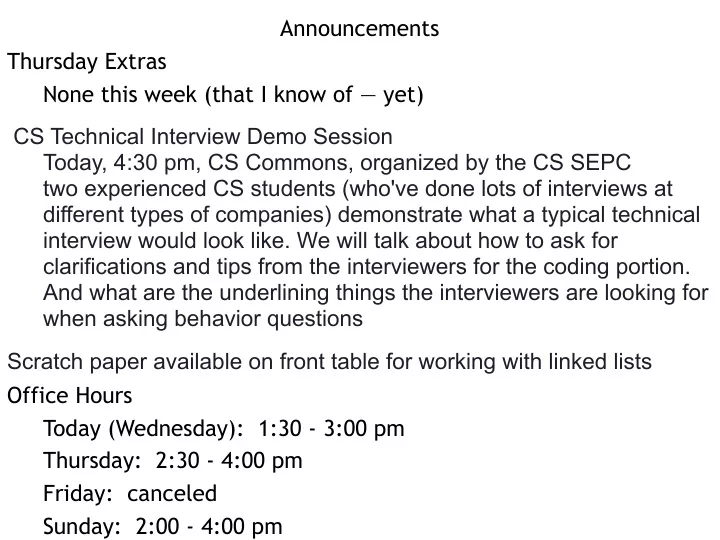

Announcements Thursday Extras None this week (that I know of — yet) CS Technical Interview Demo Session Today, 4:30 pm, CS Commons, organized by the CS SEPC two experienced CS students (who've done lots of interviews at different types of companies) demonstrate what a typical technical interview would look like. We will talk about how to ask for clarifications and tips from the interviewers for the coding portion. And what are the underlining things the interviewers are looking for when asking behavior questions Scratch paper available on front table for working with linked lists Office Hours Today (Wednesday): 1:30 - 3:00 pm Thursday: 2:30 - 4:00 pm Friday: canceled Sunday: 2:00 - 4:00 pm
More practice with Linked Lists • Today: don't change list structure • Friday: insert and/or delete nodes • Questions • Utilize lab code as templates/patterns for lab exercises • Clicker questions Lab partner change today • 2 to 1 margin in vote results!
What is printed by the following code, assuming D designates the null list: struct node * ptr = D; printf ("( "); while (ptr != NULL) { printf (" %d", ptr->data); ptr = (*ptr).next; } printf (" )\n"); A. ( ) D. possible run-time error B. ( E. something else ) C. compile error
Assume B in main points to the first node in the following list: 2 7 1 8 2 8 B What happens when main calls proc (B) int proc (struct node * ptr) { int value = 0; while (ptr != NULL) { value += (*ptr).data); ptr = ptr->next); } return value; } A. 20 returned B. 26 returned C. 28 returned D. 28 printed E. something else
Assume B in main points to the first node in the following list: 2 7 1 8 2 8 B What happens when main calls proc (B) int proc (struct node * ptr) { int value = 0; while ((*ptr).next != NULL) { value += (*ptr).data); ptr = ptr->next; } return value; } A. 20 returned B. 28 returned C. 20 printed D. 28 printed E. something else
Assume B in main points to the first node in the following list: 2 7 1 8 2 8 B What happens when main calls proc (B) int proc (struct node * ptr) { int value = 0; if ((*ptr).next != NULL) { value += (*ptr).data); proc (ptr->next); } return value; } A. 20 returned B. 26 returned C. 28 returned D. 28 printed E. something else
Assume B in main points to the first node in the following list: 2 7 1 8 2 8 B What happens when main calls proc (B) void proc (struct node * ptr) if (ptr != NULL) { proc (ptr->next); printf (" %d", ptr->data); } } A. 2 printed B. 2 7 1 8 2 8 printed C. 8 2 8 1 7 2 printed D. 8 printed E. something else
Assume B in main points to the first node in the following list: 2 7 1 8 2 8 B What happens when main calls proc (B) void proc (struct node * ptr) if (ptr != NULL) { printf (" %d", ptr->data); proc (ptr->next); } } A. 2 printed B. 2 7 1 8 2 8 printed C. 8 2 8 1 7 2 printed D. 8 printed E. something else
Recommend
More recommend